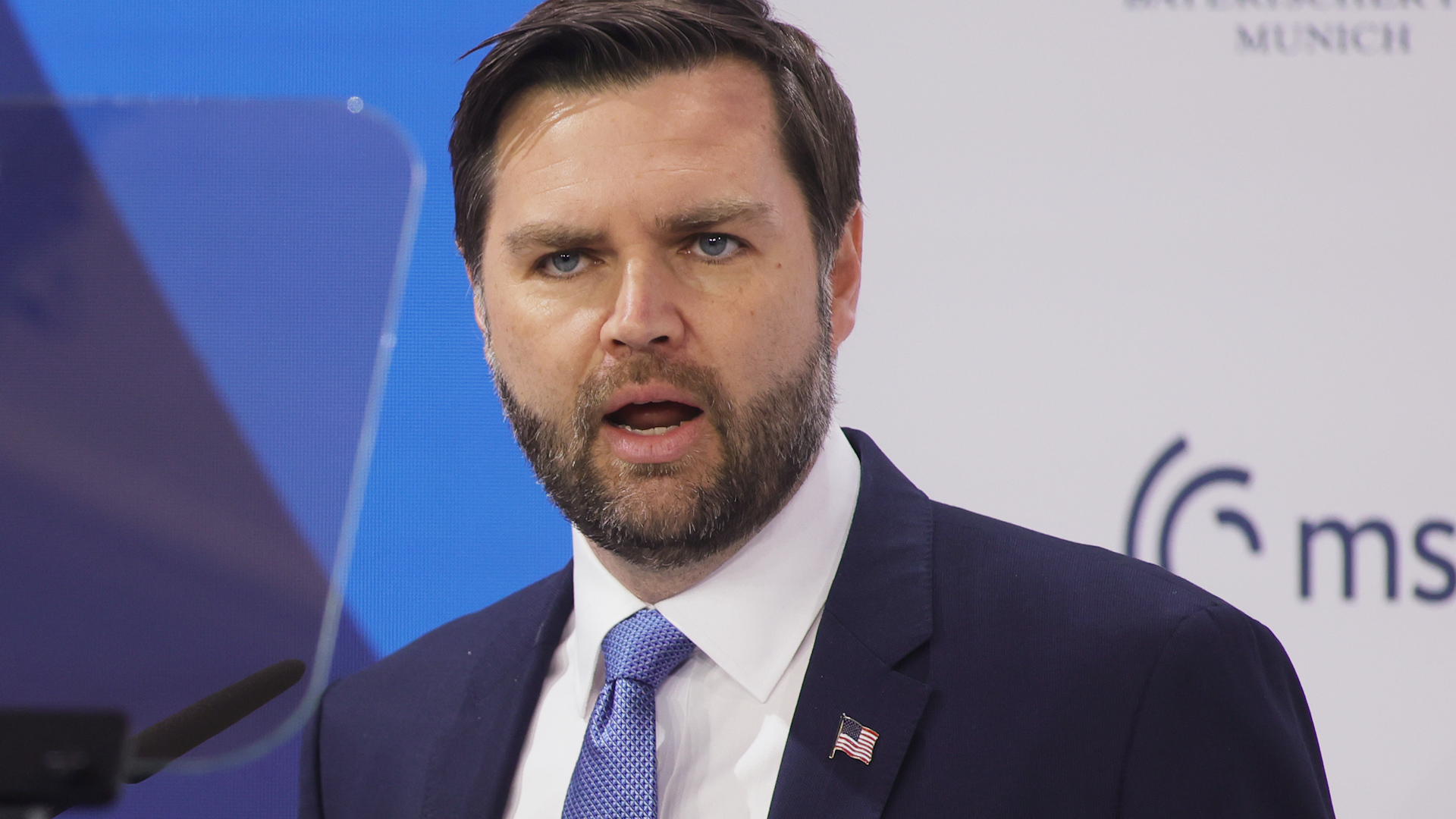
Vance signals US troops may go to Ukraine, Zelenskyy rejects forced peace
By Ryan Robertson (Anchor), William Jackson (Producer), Michael Edwards (Video Editor)
- Vice President JD Vance will meet with Ukrainian President Volodymyr Zelenskyy at the Munich Security Conference in Germany to discuss Ukraine’s future amid the ongoing war with Russia. The meeting follows President Donald Trump’s announcement of negotiations with Russian President Vladimir Putin to end the war.
- Vance emphasized U.S. commitment to Ukraine’s long-term independence, warning Moscow of potential sanctions or direct military action if negotiations fail, while Zelenskyy insisted on Ukraine’s direct involvement in any talks.
- The Trump administration’s mixed signals on its evolving strategy raise questions about the U.S. military’s future role in supporting Ukraine.
Full Story
Vice President JD Vance is meeting with Ukrainian President Volodymyr Zelenskyy at the Munich Security Conference in Germany, as discussions over Ukraine’s future take center stage. The meeting followed President Donald Trump’s announcement that he and Russian President Vladimir Putin had agreed to begin negotiations to end the war.
Media Landscape
See how news outlets across the political spectrum are covering this story. Learn moreBias Summary
- Vice President JD Vance is attending the Munich Security Conference, where he is meeting Ukrainian President Volodymyr Zelenskyy to discuss a settlement for the Russia-Ukraine conflict.
- Zelenskyy reported a Russian drone strike on the Chernobyl Nuclear Power Plant, considering it a message from Putin.
- Vance warned that a victory for Russia in Ukraine could impact security in Asia and stressed the importance of NATO burden sharing.
- Zelenskyy emphasized that Ukraine will not accept agreements made without its involvement, highlighting the importance of independence in negotiations.
- Ukrainian President Volodymyr Zelensky is set to meet U.S. Vice President JD Vance in Munich on Feb. 14, to discuss the war in Ukraine amid new U.S.-Russia peace talks.
- Zelenskyy expressed caution about trusting Russian President Vladimir Putin and insisted that Ukraine must be included in any peace negotiations with Russia.
- U.S. Vice President JD Vance stated that the US could impose sanctions and use military options against Putin if he fails to agree to a deal ensuring Ukraine's long-term independence.
- NATO is conducting military exercises in Eastern Europe, involving 10,000 troops, as concerns rise over the shift in U.S. support for Ukraine's defense.
- Ukrainian President Volodymyr Zelensky is set to meet U.S. Vice President JD Vance in Munich after Donald Trump initiated talks with Vladimir Putin about ending the war in Ukraine.
- Trump's call has raised concerns among European governments about being excluded from negotiations that may benefit Russia.
- U.S. Secretary of State Marco Rubio was scheduled to join the Munich meeting but faced travel issues due to a mechanical problem with his plane.
- Zelenskyy expressed caution regarding Putin's claims about peace readiness and may find it challenging to secure strong support from Vance for Ukraine's war efforts.
Bias Comparison
Bias Distribution
Left
Right
Untracked Bias
However, uncertainty remains over what those talks will mean for Ukraine and whether it will play a direct role.

Download the SAN app today to stay up-to-date with Unbiased. Straight Facts™.
Point phone camera here
What is the US position on the war?
Vance stated that Washington wanted a deal that guaranteed Ukraine’s long-term independence but warned Moscow of potential sanctions or military action if it refused to negotiate in good faith. He emphasized that Trump is keeping “everything on the table,” including economic leverage, diplomatic pressure and the possibility of further, and deeper, U.S. involvement.
While Vance presented a strong stance, his remarks raised questions about Washington’s overall approach.
Defense Secretary Pete Hegseth suggested earlier this week that the U.S. would not commit forces to Ukraine. Vance’s comments contradicted that position, with the vice president stating that sending U.S. troops remains an option if Russia does not seriously engage in peace talks.
How is Ukraine responding?
Zelenskyy rejected the idea of a U.S.-Russia deal that excludes Ukraine from negotiations, saying his country must participate in any discussions regarding its future. He also called for stronger security guarantees backed by the U.S. and its allies.
French President Emmanuel Macron backed Zelenskyy, warning that a “peace that is a capitulation” would set a dangerous precedent for Europe.
European Union foreign policy chief Kaja Kallas echoed this sentiment, stating that any rushed resolution could result in a deal that compromises Ukraine’s sovereignty.
What other issues is Vance raising in Munich?
Beyond Ukraine, Vance used his speech at the conference to criticize European leaders, accusing them of suppressing political opposition and ignoring rising populist movements. He defended Elon Musk, who has faced backlash from German officials for his support of far-right movements, and urged European leaders to work with anti-establishment parties.
Additionally, Vance argued that European governments should curb mass migration, warning that failure to do so could threaten stability in the region. His remarks align with the Trump administration’s broader push for European nations to reevaluate their domestic policies and security strategies.
Get up to speed on the stories leading the day every weekday morning. Sign up for the newsletter today!
Learn more about our emails. Unsubscribe anytime.
By entering your email, you agree to the Terms & Conditions and acknowledge the Privacy Policy.
What happens next?
As the Munich Security Conference continues, Ukraine remains focused on securing firm U.S. backing, while the Trump administration sends mixed signals on its evolving strategy.
With negotiations between Washington, Moscow and Kyiv looming, the central question remains: Will the U.S. maintain military support for Ukraine, or is this the start of a broader shift in American foreign policy?
[Ryan Robertson]
U.S. VICE PRESIDENT JD VANCE WILL MEET WITH UKRAINIAN PRESIDENT VOLODYMYR ZELENSKY AT THE MUNICH SECURITY CONFERENCE, WHERE THE FUTURE OF UKRAINE IS TAKING CENTER STAGE. THE TALKS FOLLOW PRESIDENT DONALD TRUMP’S ANNOUNCEMENT HE AND RUSSIAN PRESIDENT VLADIMIR PUTIN AGREED TO BEGIN NEGOTIATIONS TO END THE WAR.
VANCE SAYS WASHINGTON WANTS A DEAL THAT ENSURES UKRAINE’S LONG-TERM INDEPENDENCE BUT WARNED MOSCOW OF POTENTIAL SANCTIONS OR MILITARY ACTION IF IT REFUSES TO NEGOTIATE IN GOOD FAITH. HE REAFFIRMED TO THE WALL STREET JOURNAL THAT TRUMP IS KEEPING “EVERYTHING ON THE TABLE” WHEN IT COMES TO ENDING THE CONFLICT, INCLUDING DIPLOMATIC PRESSURE AND ECONOMIC LEVERAGE.
WHEN ASKED ABOUT THE POSSIBILITY OF SENDING U.S. TROOPS TO UKRAINE, VANCE SAID THE OPTION REMAINS OPEN IF RUSSIA FAILS TO ENGAGE SERIOUSLY IN PEACE TALKS. HIS COMMENTS SEEM TO CONTRADICT THE STANCE DEFENSE SECRETARY PETE HEGSETH OUTLINED JUST A COUPLE OF DAYS BEFORE, WHEN HE SUGGESTED WASHINGTON WOULD NOT COMMIT U-S FORCES. BUT WITH VANCE’S COMMENTS, TRUMP IS LEAVING THE POSSIBILITY ON THE TABLE, SAYING UKRAINE’S FATE DEPENDS ON HOW NEGOTIATIONS UNFOLD.
ZELENSKY SAYS HE’LL REJECT ANY U.S.-RUSSIA DEAL THAT EXCLUDES UKRAINE, INSISTING HIS COUNTRY MUST BE PART OF ANY NEGOTIATIONS. HE ALSO CALLED FOR STRONG SECURITY GUARANTEES BACKED BY THE U-S. FRENCH PRESIDENT EMMANUEL MACRON BACKED ZELENSKY, WARNING A “PEACE THAT IS A CAPITULATION” WOULD BE DANGEROUS FOR EUROPE.
VANCE ALSO USED HIS SPEECH AT THE CONFERENCE TO CRITICIZE EUROPEAN LEADERS, ACCUSING THEM OF STIFLING POLITICAL OPPOSITION. HE ALSO DEFENDED ELON MUSK, WHO IS FACING BACKLASH FROM GERMAN OFFICIALS OVER HIS SUPPORT FOR FAR-RIGHT MOVEMENTS.
JD VANCE
VICE PRESIDENT
“And trust me, I say this with all humour. If American democracy can survive ten years of Greta Thunberg scolding, you guys can survive a few months of Elon Musk. But what German democracy, what no democracy, American, German or European will survive is telling millions of voters that their thoughts and concerns, their aspirations, their pleas for relief are invalid or unworthy of even being considered.”
AS THE CONFERENCE CONTINUES, AND WITH UKRAINE PUSHING FOR STRONGER U.S. BACKING WHILE THE TRUMP ADMINISTRATION SENDS MIXED SIGNALS ON ITS SHIFTING STRATEGY; QUESTIONS REMAIN ABOUT WHETHER THE U.S. WILL KEEP SUPPORTING UKRAINE MILITARILY, OR IF THIS IS THE BEGINNING OF A NEW FOREIGN POLICY APPROACH?
FOR MORE OF OUR UNBIASED, STRAIGHT FACT REPORTING – DOWNLOAD THE STRAIGHT ARROW NEWS APP TODAY, OR LOG ON TO SAN.COM.
Media Landscape
See how news outlets across the political spectrum are covering this story. Learn moreBias Summary
- Vice President JD Vance is attending the Munich Security Conference, where he is meeting Ukrainian President Volodymyr Zelenskyy to discuss a settlement for the Russia-Ukraine conflict.
- Zelenskyy reported a Russian drone strike on the Chernobyl Nuclear Power Plant, considering it a message from Putin.
- Vance warned that a victory for Russia in Ukraine could impact security in Asia and stressed the importance of NATO burden sharing.
- Zelenskyy emphasized that Ukraine will not accept agreements made without its involvement, highlighting the importance of independence in negotiations.
- Ukrainian President Volodymyr Zelensky is set to meet U.S. Vice President JD Vance in Munich on Feb. 14, to discuss the war in Ukraine amid new U.S.-Russia peace talks.
- Zelenskyy expressed caution about trusting Russian President Vladimir Putin and insisted that Ukraine must be included in any peace negotiations with Russia.
- U.S. Vice President JD Vance stated that the US could impose sanctions and use military options against Putin if he fails to agree to a deal ensuring Ukraine's long-term independence.
- NATO is conducting military exercises in Eastern Europe, involving 10,000 troops, as concerns rise over the shift in U.S. support for Ukraine's defense.
- Ukrainian President Volodymyr Zelensky is set to meet U.S. Vice President JD Vance in Munich after Donald Trump initiated talks with Vladimir Putin about ending the war in Ukraine.
- Trump's call has raised concerns among European governments about being excluded from negotiations that may benefit Russia.
- U.S. Secretary of State Marco Rubio was scheduled to join the Munich meeting but faced travel issues due to a mechanical problem with his plane.
- Zelenskyy expressed caution regarding Putin's claims about peace readiness and may find it challenging to secure strong support from Vance for Ukraine's war efforts.
Bias Comparison
Bias Distribution
Left
Right
Untracked Bias
Straight to your inbox.
By entering your email, you agree to the Terms & Conditions and acknowledge the Privacy Policy.
MOST POPULAR
-
 U.S. Immigration and Customs Enforcement (ICE)
U.S. Immigration and Customs Enforcement (ICE)
DOJ drops lawsuits against 3 states surrounding immigration laws
Watch 2:455 hrs ago -
 Reuters
Reuters
MN jury finds leader in nation’s largest COVID-19 fraud scheme guilty
Watch 3:3310 hrs ago -

How the Department of Education spent $268 billion last year
Watch 4:4510 hrs ago -
 Getty Images
Getty Images
Pentagon considers major cuts to top of US military
Watch 2:3112 hrs ago




